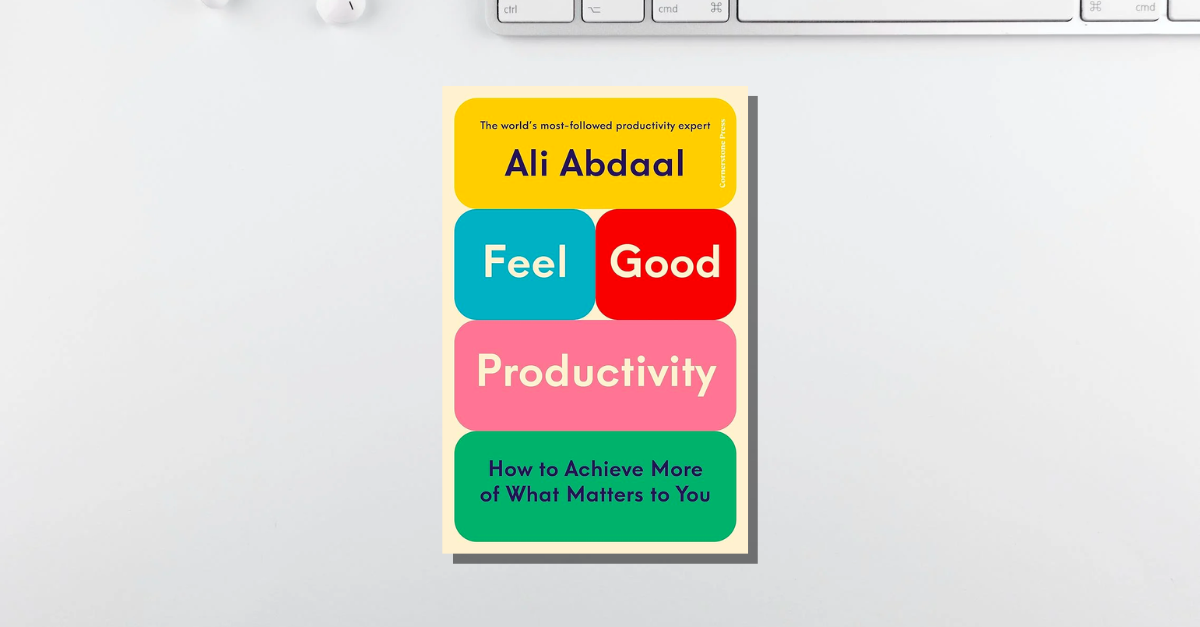My top 5 takeaways from Feel-Good Productivity by Ali Abdaal
Posted on: January 4, 2024
Post Category: Book Notes

If you’re somewhat of a self-help book reader, a decent chunk of this book won’t be particularly new. If you’ve read books like Atomic Habits (by James Clear) or The Alter Ego Effect (by Todd Hermen), some of the methods (or “experiments”) shared by Ali will be familiar.
But I suppose that’s what happens when you’re someone who’s engrossed in the genre of self-help, so this isn’t to say the book is not worthwhile.
What I particularly liked about Feel Good Productivity was the framework he shares to tackle meaningful work – the feel-good methods, the unblockers, and how to sustain productivity long-term. It’s dead simple, and it’s good to revise some of the fundamentals again, which I got to do through this read.
So here are the 5 key takeaways I took away from the book:
Obviously these 5 takeaways are not representative of everything in the book (Ali shares a total of 54 experiments you can try and I’m only sharing the top 5 I’m hoping to use). If you want to learn more, do get the book – or find a cheatsheet online (they’re already out there).
1. Planning for whenever your plan doesn’t go to plan – using The Crystal Ball Method
One of the things I still struggle with is getting things done on time – and sometimes I do not start at all.
So this method (among a couple others) was one I found particularly interesting: The Crystal Ball Method.
It consists of four steps:
- Imagine it’s one week after you set your goal, and you haven’t started. What are the top three reasons why?
- Think about what you can do to mitigate the risk of those top three reasons derailing you.
- Think about someone who can help you stick to the commitment.
- Think about the next actions you can take to increase the odds of you doing the task.
And Ali reinforces that this ‘prospective hindsight’ increases our ability to identity why things will go right/wrong by 30 percent.
2. The emotion label
When you’re procrastinating, ask yourself ‘What am I afraid of?’ Then try clarify what your fear is really about, and where it’s coming from.
3. The confidence equation
The confidence equation is basically this:
Self-confidence = Perception of Ability – Perception of Standards
And from this equation, oftentimes we feel like we need to have some level of ability to get started (i.e., having the right amount of ‘Perception of Ability’)
But oftentimes we *overestimate* the ability needed to complete a task (i.e., the ‘Perception of Standards’ is higher than what it actually is)
So whenever you feel unconfident about starting a task, invalidate the need of (good) confidence and get started anyway by asking yourself: ‘How confident do I actually need to feel to just get started with this? Could I just get started even though I’m feeling unconfident?’
4. The odyssey plan
Personally, I’m all for defining your values and what you want hope to accomplish in the long-term. Having a vision at the back of my mind is one of the key things that energises me to do relevant work. And so when Ali shared unique methods to align tasks to our long-term goals, I figured I’d give them a try.
One of these unique methods is the Odyssey Plan – to open yourself up to the different life possibilities you could pursue.
Here’s how it works. Define over a 5-year time horizon:
- What your life will look like if you go down your current path (i.e., your current path)
- What your life look like if you took a completely different path (i.e., your alternative path) and
- What your life look like if you took a completely different path where money, social obligations and what people think were irrelevant (i.e., your radical path)
Using the Odyssey Plan, you’ll start to see aspects of your alternative/radical path you’d actually like to pursue.
5. The 12-month celebration
Another unique method, similar to the Odyssey Plan, is the 12-month celebration, and this is more designed to handle medium-term goal-setting. And this method will feel familiar if you ever set yourself any new year’s resolutions.
It’s simple: go 12 months ahead in time, and write down what you’d like to tell your best friend about your progress in each of your goals or (life’s) key areas.
What are you going to celebrate in 12 months? And how are you going to get there?
Final thoughts
Even though I expected more groundbreaking methods, given Ali’s med school and YouTube excellence, the book didn’t disappoint (and fine, Ali, you can keep your secrets).
I’d go as far as to say that this book is a reminder for a lot of people (especially lifelong learners, and self-help book readers and experimenters) already have the tools they have to succeed – which is reassuring. And there are plenty of points in this book where Ali reassures us that he is in fact human (I kid).
Overall, if you’re a seasoned self-help book reader, or perhaps if you would like to read just *one* self-help book to help crush your next goals, I’d say Feel-Good Productivity is a good pick-up.

About the author
Jason Khu is the creator of Data & Development Deep Dives and currently a Data Analyst at Quantium.
Notice:
Let me know if you want a resume review from me.
I have written a Data Analyst resume checklist, which will be free for you to read when my Data Analyst Guide gets released on the 3rd of June, 2024.
But if you want specific feedback from me, delivered in a short 30-minute to 1-hour call...
Please let me know through LinkedIn, and I'll see what I can arrange!
Pricing TBD.
- Jason